Oat drinks are fast becoming a popular product.
The market offers huge potential, one that mixed farmer Liam Lynam is tapping into.
Liam, who has cattle and sheep, also grows forage crops for dairy farmers – maize and triticale – along with oats, which are fed to sheep and young stock.
Farming with his brother Paul in Co Offaly, he had been looking for another income stream.
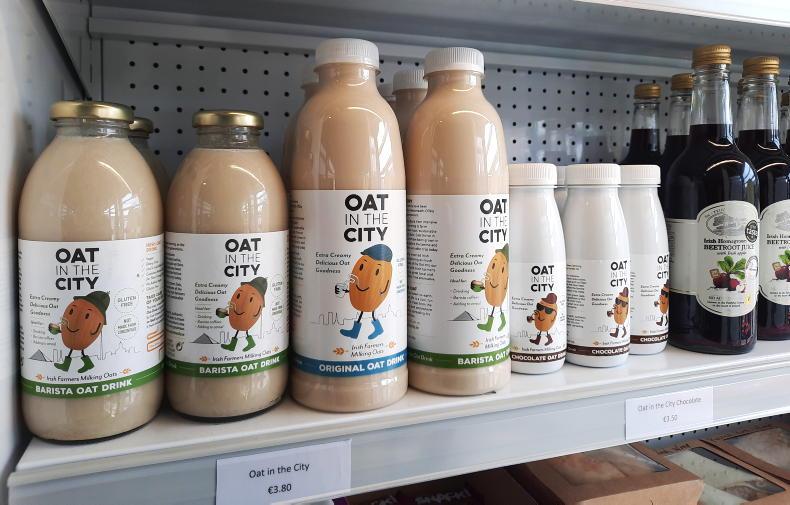
Oat in the City oat drinks in the fridge at Liam's brother's shop The King Oak in Tullamore.
When the pandemic hit, Liam began to focus on creating a food business alongside his farm.
Oat drinks are a popular choice for coffee lovers, gym goers and many in between
In the past, hemp, flax and kale had all been road tested, but one crop which the Lynams grow very well is oats and at present, demand for oat drinks is skyrocketing. Liam saw an opening.
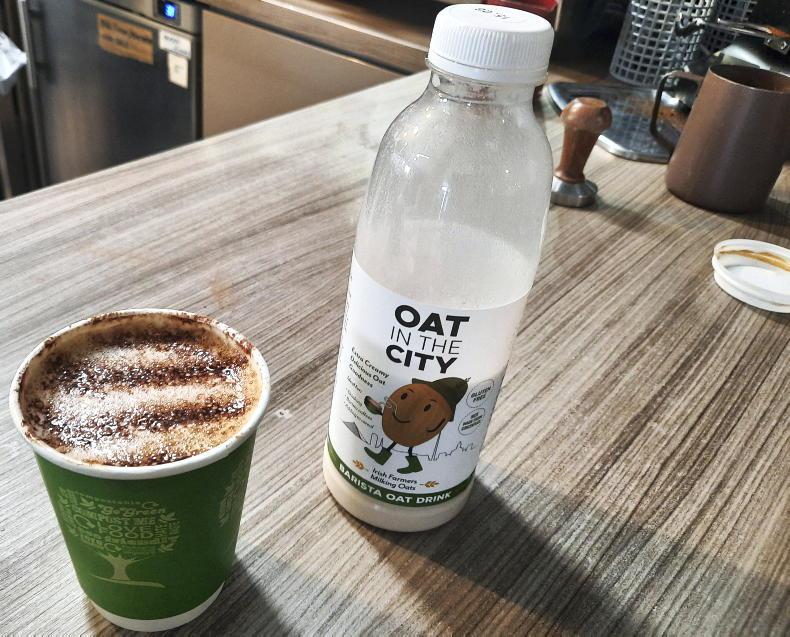
Oat drinks are becoming extremely popular with coffee drinkers.
Oat drinks are a popular choice for coffee lovers, gym goers and many in between, as well as those with food intolerances. The process of turning those oats into a drink wasn’t easy though, and was compounded by the fact that were the oats to be gluten-free, he would need a new combine which would not be used for anything else.
Somewhere along the line, we sourced the oat flour that we could process and we were very happy with the product
Having tried many different approaches, from mashing to malting, with little success, Liam became aware of Glanbia’s hydrolysed oat flour, which is produced from Irish oats and is gluten-free, and brought it to the kitchen for processing.
“We were looking at huge capital expenditure and a huge process. Somewhere along the line, we sourced the oat flour that we could process and we were very happy with the product,” Liam noted.
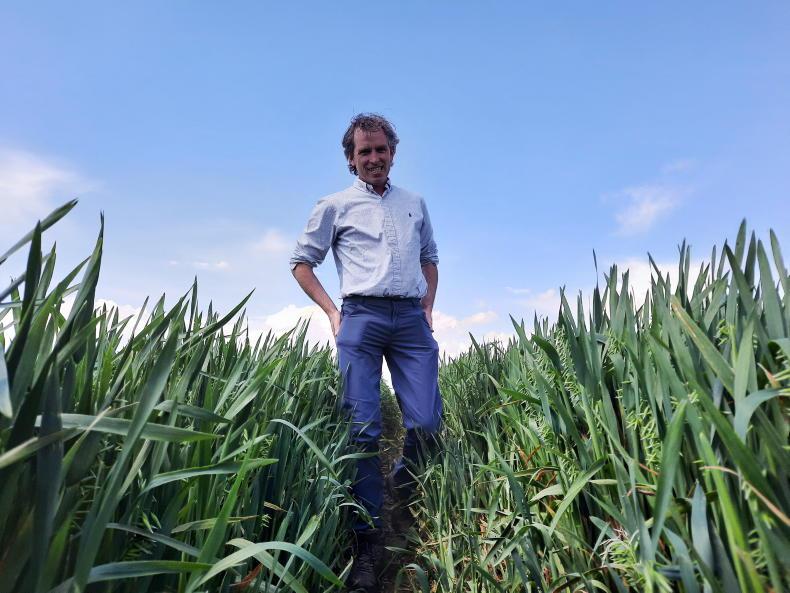
Liam Lynam in his field of oats in Co Offaly.
With the help of Teagasc Moorepark, he produced a chilled product, using the whole oat, which is lower in sugar and higher in fibre than many of the other oat drinks on the market.
Liam was disappointed that he could not use his own oat crop, but he plans to sow 40ac of gluten-free oats for Glanbia next season. His rotation, which contains grass and maize, allows him to do this, while the oats will also provide a premium price over feed oats and Glanbia will cover the cost of harvesting and transport, further increasing profit from the crop.
Local man David Ward has taken over the farm work as Liam launches his new product range. Grass was being reseeded when the Irish Farmers Journal visited.
On the supermarket shelves
With his Oat in the City products now on the shelves of his brother Paul’s shop, The King Oak, in Tullamore and landing in supermarkets, Liam is excited by the new venture, which will hopefully provide a second income while allowing him to continue farming.
We’re hitting a trend. The market is growing
Liam carried out a lot of early market research with Bord Bia’s thinking house before launching the business.
“We’re hitting a trend. The market is growing. We identified a gap in the market. Most of the products are European-sourced oats.
“There was nothing out there in the fresh chill cabinet that was an Irish product and the other big issue was when we compare the nutritional analysis of our product to our competitors a lot of the other products contained little or no fibre or protein.”
He continued: “It’s not always about looking for dairy-free. Some people find the oat tastes better with coffee. People going out for a coffee will try different options. During lockdown, research showed that sales of high-end coffee machines went through the roof. People are making their barista coffee at home.”
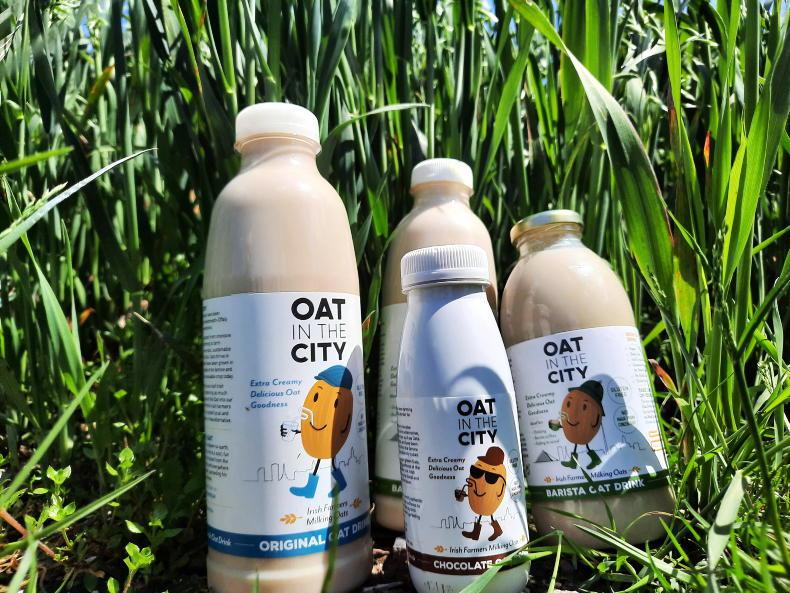
Oat in the City is the first fresh chilled Irish oat drink on the market.
Liam’s drinks will be the first Irish fresh-chilled and artisan product to market and are now on supermarket shelves. He hopes to have a door-to-door delivery service in time, but has yet to work out the logistics.
People are still going to choose dairy, but it’s another option
Liam added: “The children of this generation are four times more likely to put an alternative to dairy into their corn flakes.
“I don’t think everyone is going to go for it. People are still going to choose dairy, but it’s another option, whether it’s an orange juice or an oat drink.”
There is often a debate over plant-based alternatives to dairy. Liam is very clear that he is not anti-dairy. He has livestock himself. When he began to grow forage crops on contract for dairy farmers, he saw a gap in the market.
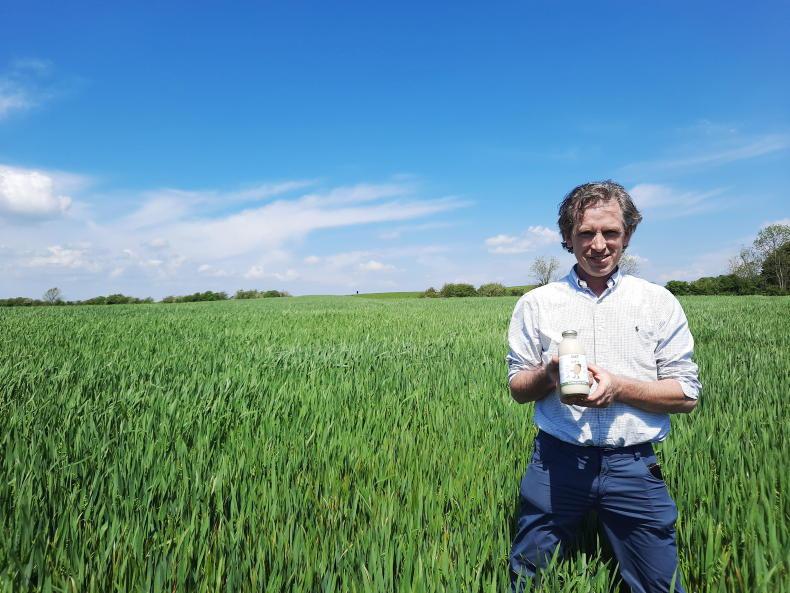
Liam Lynam with a bottle of Oat in the City in Co Offaly.
There is now a gap in the market for oat drinks, which will hopefully allow him to continue to farm and bring in another income stream.
Like those decisions make his business more sustainable, producing oat drinks is a huge market opportunity. Liam is delighted with the reaction so far.
“Within the farming community, the support has been fantastic.”
Global market for plant drinks estimated to be $2.2bn by 2024.Sales expected to grow by 20% each year to 2024.Oat drink sales doubled in the UK in the past 12 months to €94.3m.
Oat drinks are fast becoming a popular product.
The market offers huge potential, one that mixed farmer Liam Lynam is tapping into.
Liam, who has cattle and sheep, also grows forage crops for dairy farmers – maize and triticale – along with oats, which are fed to sheep and young stock.
Farming with his brother Paul in Co Offaly, he had been looking for another income stream.

Oat in the City oat drinks in the fridge at Liam's brother's shop The King Oak in Tullamore.
When the pandemic hit, Liam began to focus on creating a food business alongside his farm.
Oat drinks are a popular choice for coffee lovers, gym goers and many in between
In the past, hemp, flax and kale had all been road tested, but one crop which the Lynams grow very well is oats and at present, demand for oat drinks is skyrocketing. Liam saw an opening.

Oat drinks are becoming extremely popular with coffee drinkers.
Oat drinks are a popular choice for coffee lovers, gym goers and many in between, as well as those with food intolerances. The process of turning those oats into a drink wasn’t easy though, and was compounded by the fact that were the oats to be gluten-free, he would need a new combine which would not be used for anything else.
Somewhere along the line, we sourced the oat flour that we could process and we were very happy with the product
Having tried many different approaches, from mashing to malting, with little success, Liam became aware of Glanbia’s hydrolysed oat flour, which is produced from Irish oats and is gluten-free, and brought it to the kitchen for processing.
“We were looking at huge capital expenditure and a huge process. Somewhere along the line, we sourced the oat flour that we could process and we were very happy with the product,” Liam noted.

Liam Lynam in his field of oats in Co Offaly.
With the help of Teagasc Moorepark, he produced a chilled product, using the whole oat, which is lower in sugar and higher in fibre than many of the other oat drinks on the market.
Liam was disappointed that he could not use his own oat crop, but he plans to sow 40ac of gluten-free oats for Glanbia next season. His rotation, which contains grass and maize, allows him to do this, while the oats will also provide a premium price over feed oats and Glanbia will cover the cost of harvesting and transport, further increasing profit from the crop.
Local man David Ward has taken over the farm work as Liam launches his new product range. Grass was being reseeded when the Irish Farmers Journal visited.
On the supermarket shelves
With his Oat in the City products now on the shelves of his brother Paul’s shop, The King Oak, in Tullamore and landing in supermarkets, Liam is excited by the new venture, which will hopefully provide a second income while allowing him to continue farming.
We’re hitting a trend. The market is growing
Liam carried out a lot of early market research with Bord Bia’s thinking house before launching the business.
“We’re hitting a trend. The market is growing. We identified a gap in the market. Most of the products are European-sourced oats.
“There was nothing out there in the fresh chill cabinet that was an Irish product and the other big issue was when we compare the nutritional analysis of our product to our competitors a lot of the other products contained little or no fibre or protein.”
He continued: “It’s not always about looking for dairy-free. Some people find the oat tastes better with coffee. People going out for a coffee will try different options. During lockdown, research showed that sales of high-end coffee machines went through the roof. People are making their barista coffee at home.”

Oat in the City is the first fresh chilled Irish oat drink on the market.
Liam’s drinks will be the first Irish fresh-chilled and artisan product to market and are now on supermarket shelves. He hopes to have a door-to-door delivery service in time, but has yet to work out the logistics.
People are still going to choose dairy, but it’s another option
Liam added: “The children of this generation are four times more likely to put an alternative to dairy into their corn flakes.
“I don’t think everyone is going to go for it. People are still going to choose dairy, but it’s another option, whether it’s an orange juice or an oat drink.”
There is often a debate over plant-based alternatives to dairy. Liam is very clear that he is not anti-dairy. He has livestock himself. When he began to grow forage crops on contract for dairy farmers, he saw a gap in the market.

Liam Lynam with a bottle of Oat in the City in Co Offaly.
There is now a gap in the market for oat drinks, which will hopefully allow him to continue to farm and bring in another income stream.
Like those decisions make his business more sustainable, producing oat drinks is a huge market opportunity. Liam is delighted with the reaction so far.
“Within the farming community, the support has been fantastic.”
Global market for plant drinks estimated to be $2.2bn by 2024.Sales expected to grow by 20% each year to 2024.Oat drink sales doubled in the UK in the past 12 months to €94.3m.







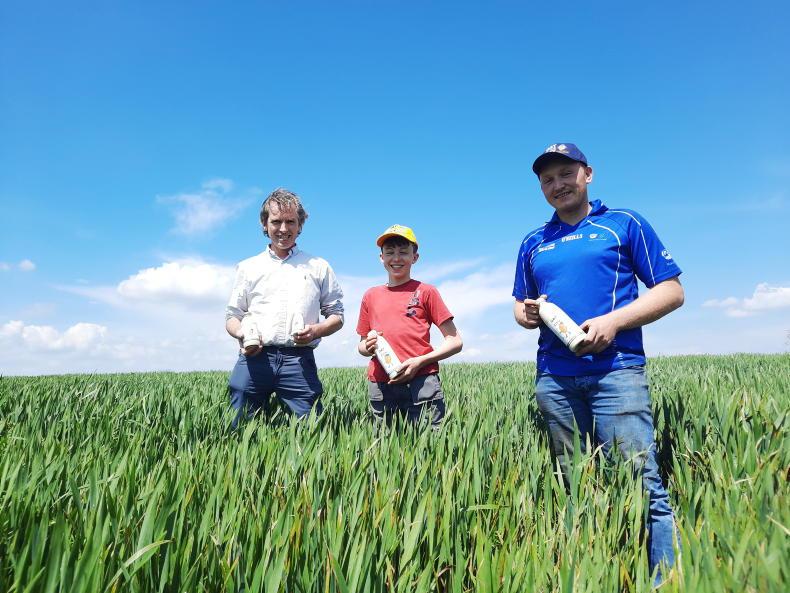




 This is a subscriber-only article
This is a subscriber-only article






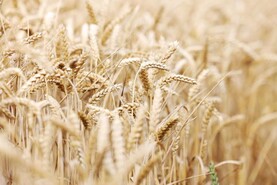



SHARING OPTIONS: